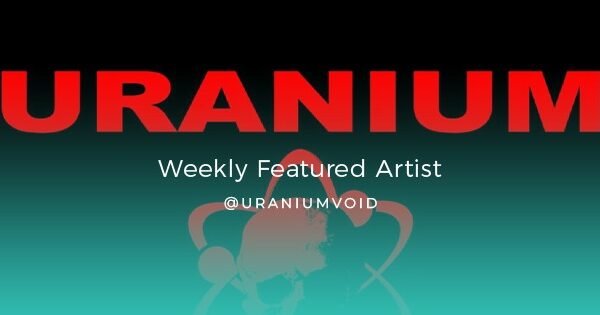33 is a record with a lot of scope. Since the preliminary release of the songs “I’ve Lost my Friends to Cocaine” and “Nuclear Option”, Grzegorz has gained a perpetual and notable following, and deservedly so. The music is dramatic, brooding, and emotional all in equal measure, harnessing some potent nuances of industrial, black metal, and electronic music. All of what you hear is the brainchild of musician Grzegorz Olszowka, whose creative intensity rings loud and clear through each song. Grzegorz was also kind enough to take the time to give Everything Is Noise an insight into his methods and incentives for making such a dynamic album, starting with its vast range of styles.
‘I had been writing and composing in all different kinds of musical styles …ranging from a lot of hip-hop to rock, pop, metal and all sorts of electronic and experimental… Over 15 years actually.
That’s probably where I developed a taste for combining stuff and also where I learned how to express myself in different styles and make them work from a technical production perspective. Even though I wrote so much for other people, I never mustered the strength to make the music I wanted to make into a fully articulated project and album. I pushed it away year after year. So last year, some barrier inside of me broke and 33 came out. Years of ideas and pressure crystallized into something I really wanted to do with all my heart‘.
As it turns out, the catalyst for this great epiphany came originally from a relatively linear line of classic bands, all with a similar musical and emotional outlook to Grzegorz.
‘Emotionally, the music that always resonated most with me was the dark stuff that I grew up with: I’ve never quit listening to Type O Negative, Nine Inch Nails, Life Of Agony, Depeche Mode, Ministry, Fear Factory and the like. It’s just something about the 80s emotional make-up that all these artists represent each in their own way (even though most of these records are from the 90s). It is hard to pinpoint what exactly defines it, but it’s one of those ‘you know it when you hear it’ things. So that’s one part of what I wanted to catch with my own music; My first ‘honest to myself and honest to the world’ album.
‘The three Nine Inch Nails albums Pretty Hate Machine, Downward Spiral and The Fragile were, in their general sound and spirit, probably more influential to this record than anything else. To me the genius of these records was to bring music into the mainstream of their time that was way too heavy for it. And I know many have criticized it for washing down or betraying something. But first, how many people have come into touch with the more underground ‘good stuff’ because of it? And second, I have never had a clearly negative association with the concept of ‘Pop’.
I rather think it is the duty of the musicians to make good things popular. I do not like the view that the music industry is doing this or that, and because of it mainstream music is plastic and soulless. Of course it is plastic and soulless, so it is the musician’s duty to make something better and to make it popular. And to fight for it; to understand how to get things popular and to do it. Especially today, when the means of music production and distribution really do lie in the hands of every bedroom producer. I am maybe bizarrely un-fatalistic in this regard’.
But let’s not overlook the visceral black metal screams dotted throughout the album. Something tells us that there is slightly more than doom and industrial at work here.
‘On the other hand I really enjoyed the new wave of black metal that reached me with Deafheaven in 2013. I think Sunbather is an incredibly influential record for so many people who just needed that little push into the heaviest corner of music, me included. So that’s where the other part came in. I somehow felt that combining these two (arguably pretty different) styles of music and expression would result in a whole, where these two elements complement each other in a way that is very close to me and yet would be something I’ve never heard before’.
As varied as they are, these influences are the right fit for the themes of 33. Within the very first handful of seconds of the album, it’s clear that Olszowka is a musician with a lot to say. The album openly depicts an apocalyptic setting, where the humanity in question is on the brink of social and mental collapse. It can almost be described as the soundtrack to a global disaster movie. Grzegorz made clear exactly what the themes are.
‘I feel 33 has one general emotional theme which is sort of told in two acts over the course of the album: The general theme is a very negative feeling of loss, frustration and sadness which gets broken apart by bursts of rage. The image I had when I wrote the stuff was of someone who is completely exhausted and then something inside lights up and all the remaining strength is burst outward, accusing and screaming in a last effort to change something or at least to let the world know about the pain.
‘This is happening in general in almost every song. But I tried to split it up into two narratives. The first of those two acts is about myself. It tackles questions about me, lost love, lost hope, disillusionment and my place in the world and it ends with the interlude “404”. The second act is about the state of the world and where we are headed. So it is mostly about nuclear war in a way, metaphorically but also literally; the inner nuclear war and the one in the real world. I think that theme is essential to most 80s music, and explains why it works when you imagine it against the backdrop of the Cold War, even if it isn’t explicitly stated’.
An insight as profound as this one brings into question a topic that many would be rightfully afraid to even tackle: The unfolding fate of humanity itself. Grzegorz, as all people who care to discuss it, has his own theories, much of which is in keeping with the themes of 33.
‘All in all, I think we are on a weirdly binary path. Everything is doomed, and totalitarian/extremist/cleptocratic/technological/etc. forces become dominant in societies with all the violent consequences dividing the world up. Or they are straight up making it inhospitable to most humans through any sort of nuclear/environmental/political/economic/technological combination of tools of destruction.
‘OR we will live in some sort of digital utopia within the time span of this century, and then colonize the stars for billions of years, abandoning our bodies, merging with some artificial intelligence and becoming immortal. Isn’t this just the oddest set of choices? I do not know if there ever was a time where the future options seemed so black and white. It almost has a religious taste to it: Heaven or hell. Maybe it turns out as it always has: Most of it mediocre with some ups and downs’.
But no matter how grandiose the scenario, it is the emotion that consistently tells the story. There is a great deal of rage and sorrow, masterfully blended within the album. 33 is raw humanity, for better of for worse.
‘Of course these are the main emotions I wanted to convey. But to go a bit deeper, I feel that music which does not explicitly say that everything will be okay, and that there is still hope, has the tendency to better help me in times where I would actually need hope. I need someone who emphasizes with me, who tells me that I am not alone with my feeling of hopelessness, sorrow and anger, and that it is okay to feel and channel them. Not someone who tells me I or (even more ludicrous) everything will be fine. The way ‘out’ of this is ‘through’ it in a lot of ways. So if I can make that kind of music for someone, then I should. And yes there is a bit of a feeling of duty in me that I want to help people get through their and our difficult times’.
One of the many highlights of the album is the song “I’ve Lost my Friends to Cocaine”. It has earned a formidable number of listens since its time on YouTube. And though the subject matter seems obvious on the surface, there is actually a little more to it. ‘I did lose a lot of friends to cocaine, but no one I knew closely died because of it,’ explains Grzegorz. ‘That’s not what I was trying to say, though I do know people can and do die because of it. What happened was that a lot of my friends started taking cocaine, they changed, and now I am no longer friends with them.
‘The devious thing about the working of cocaine that I wanted to point out in the song is that it makes people function better in our society. They become more performant, more successful, more outgoing, and they fit in better. And neither the drug itself nor the people taking it are primarily to blame. It’s society’s fault. I know a lot of people have experienced similar things but it’s still an existentially sad experience to go through, and I definitely have had to higher my standards of being friends with people as a self-defense mechanism.
‘That is my experience that led to me writing the song. But I can see how people relate to the song in different ways. I’ve received some pretty moving messages from the U.S. and Latin America from people who abused the drug themselves and drove their friends away as a result, as well as from people who had friends die from it. It is deeply touching‘.
From one track to the next, 33 displays a mastery of composition. Drumming aside, Olszowka composed it all himself, paying his dues and exercising discipline in extreme hardcore fashion.
‘The production process was very solitary and cathartic. I slept in my studio and worked for 16 hours a day for months. It was extreme but so satisfying and it felt right, like nothing I ever attempted before. I composed, played and recorded everything myself except for the drums. Paul Seidel, who is a good friend I have played with in bands for the past 15 years, and who now plays drums with The Ocean and a ton of other excellent bands, recorded them for me’.
Another highlight comes in the form of Grzegorz‘s unique cover of Kim Wylde’s “Kids in America”
‘I just really love the song and I have always been a huge fan of songs that change their meaning when they are performed in a different way. So by making “Kids in America” extremely dark, I felt a whole other dimension in the lyrics pop out. It kind of felt like we really all are ‘kids in America’, helpless and naive to the ways in which the world works. Also the current changes in the political landscapes all over the world gave the song yet another level I felt. That’s what gave me the idea to put in the audio of protests at the end of the song. I felt it worked well in the context of the album’.
It is clear that Grzegorz is outbound to success. After all, he has done everything right so far. And the next evolutionary step will most likely be bringing 33 to the live stage.
‘As to when and how exactly I am not ready to say yet. But it will happen. And sooner rather than later’.
Here’s hoping sooner. In the meantime, fans have the pending release of 33 in full to look forward to. And this may very well be just the beginning. After all, Grzegorz Olszowka is an individual whose relationship with music is rough, ready, and totally fundamental to his existence.
‘Making music is my primary way of expression. There is nothing I have found that gives me more purpose in life. It isn’t always fun. In fact it almost never is all fun. It is a painful, self-harming, self-hating, self-doubting way of leading my life. And I wouldn’t trade it for anything’.
33 will be released October 26, so keep a close eye on Grzegorz‘s Spotify and Bandcamp pages, as well as his YouTube channel. For all other news, visit his official Facebook page.






